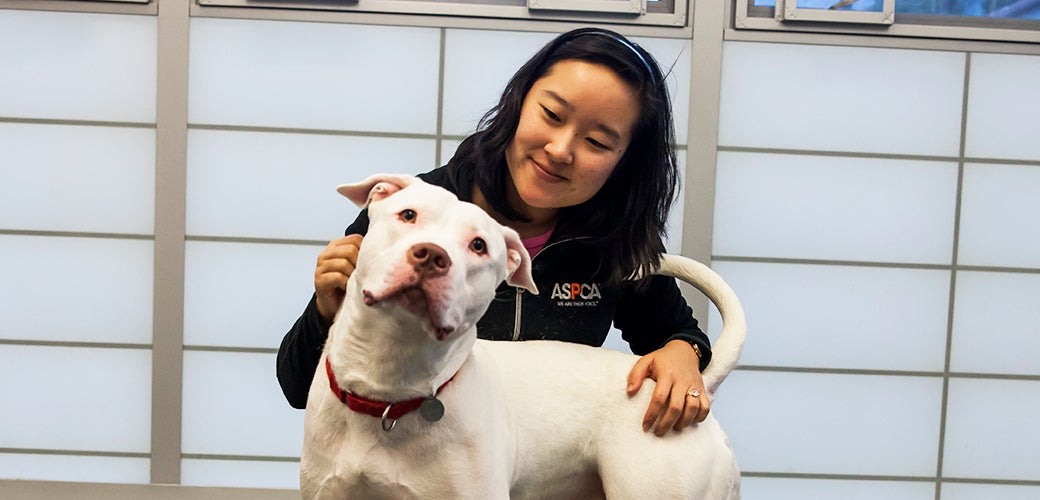Top strategies in veterinary behaviour for addressing aggression
Comprehending the Role of a Vet Behaviourist in Pet Dog Training and Well-being
The role of a veterinary behaviourist is crucial in resolving the detailed partnership in between family pets and their proprietors. They incorporate vet medication with understandings from animal habits science to deal with concerns like hostility and stress and anxiety. Unlike conventional fitness instructors, their method concentrates on the underlying causes of these habits. This nuanced viewpoint questions concerning the effectiveness of traditional training approaches and just how a deeper understanding can change pet wellness. What approaches do they utilize to achieve these outcomes?
What Is a Veterinary Behaviourist?
A vet behaviourist is a customized specialist who focuses on understanding and resolving the behavioral problems of pets, specifically family pets. Their experience integrates vet medicine and pet behavior scientific research, enabling them to identify and treat a vast array of behavior troubles - board certified veterinary behaviourist. These experts often hold sophisticated degrees, such as a Master's or PhD in animal habits, and are accredited by appropriate organizations, guaranteeing they possess a deep understanding of pet psychology
Veterinary behaviourists analyze pets with in-depth observation and analysis, taking into consideration variables such as genetics, atmosphere, and training history. They develop tailored therapy strategies, which might include desensitization methods, favorable reinforcement strategies, and ecological modifications. Partnership with pet dog proprietors is vital, as they give guidance and support throughout the training process. Ultimately, the goal of a veterinary behaviourist is to enhance the wellness of the pet while cultivating an unified partnership in between pet dogs and their proprietors.
The Importance of Understanding Animal Habits
Comprehending pet habits is crucial for both pet owners and experts in the field of animal treatment, as it lays the structure for efficient interaction and training. Recognizing how pets regard their setting and respond to stimuli allows caretakers to develop an extra unified living situation. Insight right into behavior hints, such as body movement and vocalizations, cultivates more powerful bonds in between pet dogs and their proprietors. By valuing the all-natural impulses and requirements of different species, individuals can customize their training approaches to fit these elements, promoting far better understanding and cooperation. In addition, a solid grasp of behavior science aids in recognizing stressors and possible triggers, enabling proactive treatments. Generally, understanding pet habits not just improves the well-being of family pets however likewise improves the experiences of those that take care of them, ultimately causing healthier, happier relationships.
Common Behavioral Issues Resolved by Veterinary Behaviourists
Vet behaviourists frequently resolve common behavior issues in family pets, including hostility and fear feedbacks. They also concentrate on anxiety and anxiety management, which can substantially impact a pet's health. Understanding these problems is vital for creating effective training and treatment strategies.
Hostility and Anxiety Reactions
While lots of pet proprietors may check out aggressiveness and worry feedbacks as basic behavior problems, these complex reactions usually originate from underlying stress and anxiety or past trauma. Vet behaviourists play a necessary function in recognizing the origin of these habits, which can manifest in numerous kinds, including growling, biting, or excessive concern of specific scenarios. Recognizing these triggers is vital for developing effective training methods tailored to every family pet's unique scenarios. Behaviourists utilize techniques such as desensitization and counter-conditioning to aid pet dogs handle their anxieties and aggression. Additionally, they enlighten family pet owners regarding ideal administration strategies, emphasizing the value of persistence and consistency. Dealing with aggression and worry responses not just boosts the family pet's high quality of life however likewise strengthens the bond in between pet dog and owner.
Anxiety and Tension Monitoring
Anxiety and stress are prevalent issues that several family pets deal with, often resulting from changes in their environment, lack of socialization, or previous negative experiences. Veterinary behaviourists play an important role in recognizing the underlying root causes of these problems. They employ various methods, including behavioral alteration, desensitization, and counter-conditioning, to assist family pets manage anxiousness. On top of that, they may advise ecological changes, such as developing safe rooms or supplying enrichment activities that advertise relaxation. Cooperation with family pet owners is necessary, as behaviourists direct them in recognizing their animal's signals and applying efficient coping approaches. By attending to anxiousness and anxiety, vet behaviourists contribute considerably to improving the general health and lifestyle for family pets and their families.
How Vet Behaviourists Vary From Conventional Instructors
Vet behaviourists differ from traditional trainers mainly in their academic histories and training. While typical fitness instructors often concentrate on obedience and fundamental commands, vet behaviourists stress understanding and dealing with underlying behavioral problems, incorporating clinical factors to consider right into their approach. This distinct focus allows them to offer a much more thorough treatment for animals with complicated behavior difficulties.
Education And Learning and Training Distinctions
Recognizing the difference in between vet behaviourists and click reference typical instructors is essential for pet dog proprietors looking for efficient training options. Vet behaviourists possess sophisticated degrees in veterinary medicine, frequently followed by specialized training in animal behaviour. This education and learning outfits them to address complex behavioral concerns that might come from medical conditions or psychological factors. In contrast, conventional trainers usually have accreditations from training programs that focus on obedience and standard commands without delving into the underlying emotional or medical facets. While both specialists intend to enhance family pet behavior, veterinary behaviourists can diagnose and deal with behavioural problems holistically, incorporating clinical expertise right into training techniques. This essential distinction highlights the relevance of selecting the ideal specialist based on the family pet's details demands.
Focus on Behavioral Issues
Addressing behavioural issues needs a nuanced method that identifies vet behaviourists from conventional trainers. While traditional trainers often concentrate on obedience and basic commands, veterinary behaviourists explore deeper right into the underlying sources of troublesome practices. They utilize a considerable understanding of pet psychology and therapy techniques, which are rooted in scientific research. This knowledge enables them to recognize concerns stemming from stress and anxiety, worry, or hostility, as opposed to merely dealing with surface-level symptoms. On top of that, vet behaviourists evaluate the pet dog's general wellness, taking into consideration environmental aspects and the animal's background. By integrating medical knowledge with behavioural techniques, they give tailored solutions that advertise lasting behavioural adjustment, ensuring both the animal's and proprietor's lifestyle are significantly improved.
Clinical Considerations Consisted Of
While standard fitness instructors may ignore underlying clinical concerns, vet behaviourists focus on a complete analysis of an animal's health as a foundational action in resolving behavioral troubles. This technique enables them to determine prospective medical problems that may contribute to unwanted practices, such as stress and anxiety, pain, or neurological problems. By incorporating medical analyses right into their practice, vet behaviourists can team up with veterinarians to ensure a holistic understanding of the family pet's health. Furthermore, they can recommend proper treatments or index adjustments to training plans based upon medical searchings for. This substantial perspective differentiates vet behaviourists from traditional fitness instructors, as they address both behavioural and health-related factors, eventually leading to a lot more reliable and sustainable results for pet dogs and their proprietors.

The Process of Dealing With a Veterinary Behaviourist
Working together with a veterinary behaviourist entails an organized strategy to resolving an animal's behavioral problems. The procedure begins with a considerable analysis, where the behaviourist gathers in-depth information regarding the animal's background, setting, and details actions that are troublesome. This usually includes questionnaires, meetings with the pet dog owner, and in some cases monitorings of the pet in its environment.
Complying with the analysis, the veterinary behaviourist develops a tailored treatment strategy that may include behavior modification strategies, training strategies, and, if essential, referrals for medical assessments. dog behaviourist near me. The strategy is developed to be useful and attainable, making sure that it fits seamlessly into the pet dog proprietor's way of life
Succeeding follow-up sessions are vital to monitor development, adjust techniques, and provide support. This joint effort not just aims to customize unwanted behaviors yet additionally to boost the overall wellness of the pet dog, making sure a harmonious partnership between the pet and its owner.
Enhancing Your Animal's Lifestyle Through Behavioral Support
Enhancing a pet dog's top quality of life through behavior support is vital for cultivating a Discover More healthy and meeting relationship in between pet dogs and their owners (board certified veterinary behaviourist). Veterinary behaviourists play an essential duty in identifying and resolving behavior concerns that might prevent an animal's well-being. With tailored methods, they help alleviate stress and anxiety, fear, and aggressiveness, ultimately advertising a much more well balanced and satisfied pet dog
Behavior support encompasses various methods, consisting of positive reinforcement, environmental enrichment, and socialization. By carrying out these strategies, proprietors can develop a caring atmosphere that urges positive behaviors. This not just enhances the pet's psychological wellness but likewise strengthens the bond between pet and owner.
Furthermore, regular appointments with a vet behaviourist assurance that any type of emerging behavioral concerns are immediately dealt with, protecting against rise. Generally, buying behavioral assistance is an aggressive strategy that significantly improves a pet dog's life, leading to enhanced physical and psychological health and wellness end results.
Frequently Asked Questions
What Credentials Do Veterinary Behaviourists Possess?
Veterinary behaviourists commonly hold a veterinary degree, complied with by specialized training in animal actions. Numerous likewise possess certifications from recognized companies, showing their knowledge in dealing with animal behavior problems and promoting general animal health.
Can Vet Behaviourists Recommend Medication for Family Pets?


Veterinary behaviourists, possessing veterinary degrees and specialized training, can without a doubt prescribe drug for pet dogs. This capability allows them to address underlying behavioral problems successfully, typically integrating pharmacological treatment with behavior modification methods for ideal outcomes.
How Much Time Does Behavioral Treatment Normally Take?
Behavior modification period differs substantially, typically varying from a couple of weeks to numerous months. Elements influencing this timeline include the pet dog's certain concerns, uniformity of training, and the owner's engagement in the procedure.
Are Remote Consultations Offered With Veterinary Behaviourists?

Just how much Does a Veterinary Behaviourist Examination Cost?
The price of a veterinary behaviourist examination typically ranges from $100 to $300, depending upon elements such as place, experience, and session size. Additional costs may request follow-up assessments or specialized solutions.